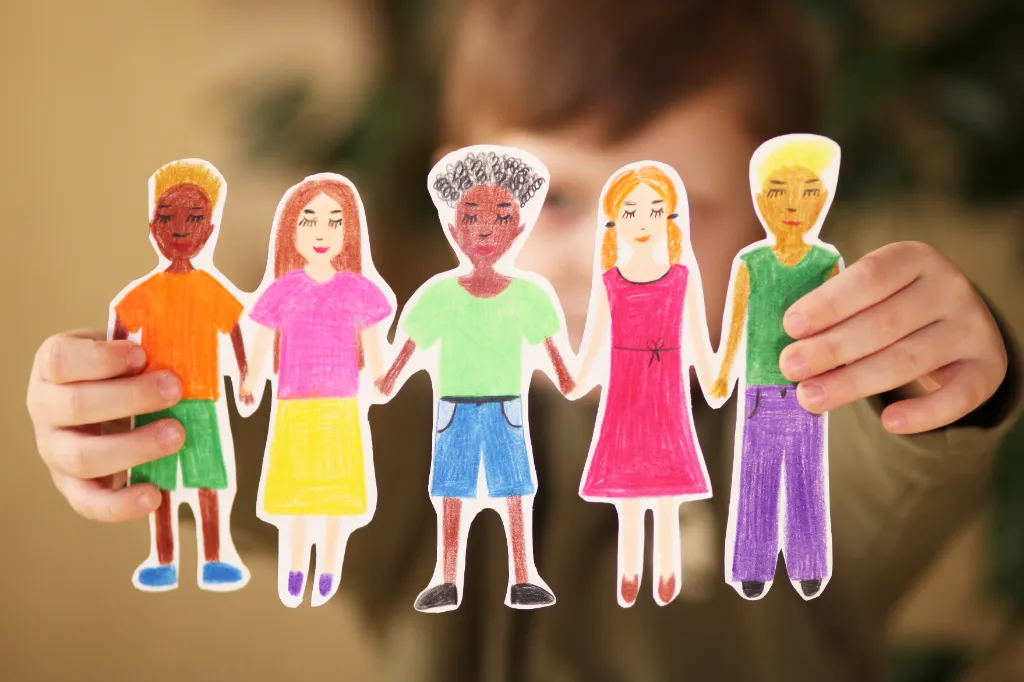Definition of Neurodiversity
Neurodiversity is the concept of recognising and embracing the differences in how people’s brains work. This natural variation in the human brain explains that there is no such thing as a “normal” or “standard” functioning of the brain, but rather, a spectrum of neurological differences. This includes people on the autism spectrum, ADHD, dyslexia, and Tourette’s syndrome.
People who are neurodivergent process information differently and also learn and perceive the world around us differently than the neurotypical population. Fostering and celebrating neurodiversity in schools and within the community can improve creativity, innovation, and problem-solving and enrich the vast pool of solutions, ideas and options. Accepting neurodiversity is slowly becoming a strong societal principle as it focuses on empowering children to love their unique minds and live an enjoyable life in today’s inclusive world.
The Importance of Understanding Children’s Diverse Abilities
Understanding children’s diverse abilities is essential as it promotes equality in education and fosters a nurturing environment that can help children thrive. Also, understanding children’s unique skills and abilities can help identify and address possible learning barriers while facilitating early interventions and proper support.

Each child has unique strengths but also faces unique challenges in everyday life. Recognising these differences allows educators, teachers and family members to find teaching techniques and support systems tailored to the needs of every child. By acknowledging children’s diverse abilities, educators can work on personalised learning plans and enable all children to reach their full potential.
By doing this, classroom environments will become more accepting, and the stigmatisation around neurodiversity can be significantly reduced. Children can easily learn to respect one another, and it allows them to promote empathy and develop strong friendships for a lifetime.
Acknowledging neurodiversity allows educators to detect children with learning disabilities and developmental delays faster. It helps their parents and carers develop a personalised plan to cater to their needs. Embracing diversity not only enhances children’s abilities to reach various educational milestones and achievements, but it also helps promote children’s emotional and psychological well-being. When children feel valued, seen and understood, they are prone to developing a positive image of themselves and a healthy mindset, which can help them grow into confident individuals who will contribute in every way to society.
Difference Between Neurodivergent and Neurotypical Children
The difference between neurodiverse and neurotypical children is becoming a popular topic. Explaining the term “neurotypical” can be challenging, but it means that someone’s brain develops in a way society is most familiar with. On the other hand, “neurodivergent” children’s brain works differently than neurotypical people and they often show differences in behaviours and development. People tend to categorise others rather than focus on helping them thrive and being understanding. Learning neurodiversity is essential in understanding and developing compassionate and understanding relationships with people.
Common Neurodivergent Conditions in Children
1 in 7 children have variations in brain development, but neurodiversity is not a medical diagnosis. It explains the neurological differences that affect how children’s brains work and their behaviour, learning patterns and social interactions.
The most common differences that children experience are:
- ADHD – Attention Deficit Hyperactivity Disorder
- Autism Spectrum Disorder
- Learning Difficulties
- Tourette’s syndrome
Some people with mental health conditions, such as social anxiety disorder and obsessive-compulsive disorder, may also identify as neurodivergent.
Due to differences in brain functioning, it can be challenging for children to develop social relationships and participate in group activities. Children also often have co-occurring challenges with sensory processing. As a society, we must recognise and provide support to neurodivergent individuals. We can contribute to developing a safer environment by catering to their unique needs, strengths and abilities.
At Unique Community Services, we support neurodivergent children to improve their overall well-being, mental health and other challenges in daily lives while enabling them to thrive in all aspects of life. Through our person-centred and holistic approach, our clinicians support children in reaching their full potential and leading fulfilling lives.
Positive Aspects of Neurodiversity
Neurodiversity carries plenty of positive aspects and benefits that contribute to the rich diversity in our society. Children with neurodivergent traits often possess exceptional problem-solving skills, a strong eye for detail, and enhanced creativity. These traits can help them lead innovation and make breakthroughs across many fields. Their unconventional approach to challenges and problems inspires creative solutions and promotes a culture of diversity, which empowers people to contribute to society and an overall benefit for humanity.

Celebrating the wide spectrum of neurological differences in neurodivergent people fosters a deep understanding of people’s unique experiences and perspectives. By embracing neurodiversity, we can collectively open the gate towards an accepting world where every individual is seen as worthy and is recognised and cherished.
Unique Strengths of Neurodiversity
Among the many strengths neurodivergent children have, they also have the increased ability to think outside the box and see things from different perspectives. Their unique thought process allows children to look beyond the standard perspectives and provide an alternative view on solving problems and challenges. Neurodivergent children develop creative ideas that challenge the norm and lead society to grow and expand.
Neurodivergent students also have vivid imaginations and possess a strong level of creativity, which helps them create ideas and solutions that are truly unique.
Highlighting the Creativity and Innovation
Neurodiversity significantly impacts society as it introduces new perspectives, innovation, and creativity. Neurodivergent people have their way of delivering solutions and innovation that others might not think of. Their attention to detail and exceptional analytic skills have made a tremendous impact in the fields of mathematics, science and technology. There have been many breakthroughs under the umbrella of neurodiversity as it brings a sense of brilliance to the world.
Supporting Neurodivergent Children
Supporting neurodivergent children is all about embracing their unique strengths and abilities. Supporting neurodiversity means understanding and guiding society towards actively listening and learning people’s different perspectives. Their incredible young minds see the world differently, with kindness, empathy and patience, which is why we need to focus on creating a safe space for them to allow them to thrive. Celebrating children’s achievements and providing tailored support helps them confidently navigate through life.
Advocacy and Awareness
The first step towards increasing awareness is to understand and use the term neurodiversity, which helps us get closer towards creating an inclusive society for everyone. Being vocal advocates for children who are neurodiverse is essential in the role of empowering and enhancing their different needs. When children feel valued and recognised, they can create meaningful relationships and thrive in society.
Caregivers play a vital role in developing personalised plans that find the best approach for each child. They act as their voice and ally as they work with educators, healthcare professionals and many other community members to promote inclusion and create an environment where children’s needs would be catered to.
Creating Inclusive and Supportive Environments
There are many ways to create an inclusive and safe environment for neurodivergent children. One of the ways is to offer support through assistive technology, sensory toys and tailored care plans. Creating an inclusive environment also involves promoting awareness and education about neurodiversity.
Unique Community Services develops individualised care plans that find their foundation in Positive Behaviour Support (PBS) and PROACT SCIPr. Embracing people’s differences enriches our community with diverse perspectives and paves the way for a compassionate world where everyone can actively contribute.
Nurturing Self-Esteem and Self-Acceptance
By offering a nurturing environment, understanding and love, caregivers can foster acceptance and increased well-being. Encouraging people who are neurodivergent to embrace their unique abilities, emotions, and experiences helps them boost their self-esteem.
Promoting open communication and constantly listening to their concerns can enhance confidence and self-esteem. When caregivers boost self-acceptance and self-esteem, neurodivergent children can develop a positive image of themselves and live fulfilling lives no matter the challenges ahead.
Educating Peers about Neurodiversity
The first essential step to promote understanding among peers is explaining that neurodiversity encompasses neurological differences in children. Providing insights into the range of neurological variations and neurodivergent behaviours helps neurotypical individuals to embrace the different perspectives and strengths of neurodivergent children. Caregivers and teachers should be vocal advocates, encouraging open discussions about challenges and assisting others to recognise that everyone’s experience is different.
Educating people through various activities can showcase the abilities of neurodivergent children and share their unique perspectives that help outline the importance of diversity and inclusion and help create an environment where all children will feel valued and accepted.
Unique Community Services Supports Neurodivergent Children
At Unique Community Services, we develop comprehensive care plans and humanised approaches to tailoring our care to the specific needs of each individual we serve.
Our clinicians provide personalised support for neurodivergent children by recognising their challenges and focusing on their strengths, helping them be their best selves. Our Positive Behaviour Support practices foster an inclusive environment and encourage holistic support for the people we support.
Our highly trained clinicians deliver proactive care and support across the UK with offices in Bristol and Manchester.
For more information, contact us today!














